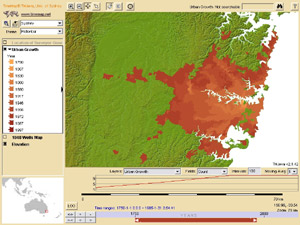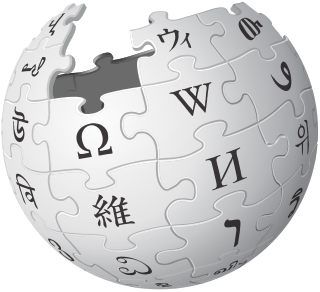History
The idea of a free online resource compiling Shakespeare's works was conceived in 2001 by Eric M. Johnson, then working as a web designer and theater reviewer for the Washington Times newspaper while pursuing a Master's degree at George Mason University. [2] In the process of looking up the source of Shakespearian quotes online, Johnson was surprised to learn that no single web resource allowed users to freely access a comprehensive collection of William Shakespeare's writings. [2]
"The ones that were comprehensive were not free, and the free ones were not comprehensive" Johnson recalled. [2]
Johnson started to create just such a free and comprehensive digital collection as part of his graduate program, unveiled as the Open Source Shakespeare website in December 2003. [3] The site was formally announced to the scholarly community in February 2004. [3]
According to the site's founder, about 77,000 people made use of the resource in 2005, with a further 170,000 anticipated to visit the site in 2006. [3] The operating costs of the site were minimal; through 2006, these were paid out of pocket by the site's creator. [3] Subsequently, a grant application was made to the National Endowment for the Humanities by Johnson and three members of the English Department of George Mason University to provide funding for the project. [2]
The Gopher protocol is a communication protocol designed for distributing, searching, and retrieving documents in Internet Protocol networks. The design of the Gopher protocol and user interface is menu-driven, and presented an alternative to the World Wide Web in its early stages, but ultimately fell into disfavor, yielding to HTTP. The Gopher ecosystem is often regarded as the effective predecessor of the World Wide Web.

MSN is an American web portal and related collection of Internet services and apps for Windows and mobile devices, provided by Microsoft and launched on August 24, 1995, alongside the release of Windows 95.
The Perseus Digital Library, formerly known as the Perseus Project, is a free-access digital library founded by Gregory Crane in 1987 and hosted by the Department of Classical Studies of Tufts University. One of the pioneers of digital libraries, its self-proclaimed mission is to make the full record of humanity available to everyone. While originally focused on the ancient Greco-Roman world, it has since diversified and offers materials in Arabic, Germanic, English Renaissance literature, 19th century American documents and Italian poetry in Latin, and has sprouted several child projects and international cooperation. The current version, Perseus 4.0, is also known as the Perseus Hopper, and is mirrored by the University of Chicago.

The SWORD Project is the CrossWire Bible Society's free software project. Its purpose is to create cross-platform open-source tools—covered by the GNU General Public License—that allow programmers and Bible societies to write new Bible software more quickly and easily.

ZDNET is a business technology news website owned and operated by Red Ventures. The brand was founded on April 1, 1991, as a general interest technology portal from Ziff Davis and evolved into an enterprise IT–focused online publication.
An application program is a computer program designed to carry out a specific task other than one relating to the operation of the computer itself, typically to be used by end-users. Word processors, media players, and accounting software are examples. The collective noun "application software" refers to all applications collectively. The other principal classifications of software are system software, relating to the operation of the computer, and utility software ("utilities").
The online public access catalog (OPAC), now frequently synonymous with library catalog, is an online database of materials held by a library or group of libraries. Online catalogs have largely replaced the analog card catalogs previously used in libraries.

A metasearch engine is an online information retrieval tool that uses the data of a web search engine to produce its own results. Metasearch engines take input from a user and immediately query search engines for results. Sufficient data is gathered, ranked, and presented to the users.

Minimo was a project to create a version of the Mozilla web browser for small devices like personal digital assistants and mobile phones.

Fedora is a digital asset management (DAM) content repository architecture upon which institutional repositories, digital archives, and digital library systems might be built. Fedora is the underlying architecture for a digital repository, and is not a complete management, indexing, discovery, and delivery application. It is a modular architecture built on the principle that interoperability and extensibility are best achieved by the integration of data, interfaces, and mechanisms as clearly defined modules.

Zotero is free and open-source reference management software to manage bibliographic data and related research materials, such as PDF and ePUB files. Features include web browser integration, online syncing, generation of in-text citations, footnotes, and bibliographies, integrated PDF, ePUB and HTML readers with annotation capabilities, and a note editor, as well as integration with the word processors Microsoft Word, LibreOffice Writer, and Google Docs. It was originally created at the Center for History and New Media at George Mason University and, as of 2021, is developed by the non-profit Corporation for Digital Scholarship.
The online service imeem was a social media website where users interacted with each other by streaming, uploading and sharing music and music videos. It operated from 2003 until 2009 when it was shut down after being acquired by MySpace.

BASE is a multi-disciplinary search engine to scholarly internet resources, created by Bielefeld University Library in Bielefeld, Germany. It is based on free and open-source software such as Apache Solr and VuFind. It harvests OAI metadata from institutional repositories and other academic digital libraries that implement the Open Archives Initiative Protocol for Metadata Harvesting (OAI-PMH), and then normalizes and indexes the data for searching. In addition to OAI metadata, the library indexes selected web sites and local data collections, all of which can be searched via a single search interface.
Biblical software or Bible software is a group of computer applications designed to read, study and in some cases discuss biblical texts and concepts. Biblical software programs are similar to e-book readers in that they include digitally formatted books, may be used to display a wide variety of inspirational books and Bibles, and can be used on portable computers. However, biblical software is geared more toward word and phrase searches, accessing study bible notes and commentaries, referencing various modern translations, cross-referencing similar passages and topics, biblical dictionaries, original language texts and language tools, maps, charts, and other e-books deemed relevant to understanding texts from a philological approach.

A digital library is an online database of digital objects that can include text, still images, audio, video, digital documents, or other digital media formats or a library accessible through the internet. Objects can consist of digitized content like print or photographs, as well as originally produced digital content like word processor files or social media posts. In addition to storing content, digital libraries provide means for organizing, searching, and retrieving the content contained in the collection. Digital libraries can vary immensely in size and scope, and can be maintained by individuals or organizations. The digital content may be stored locally, or accessed remotely via computer networks. These information retrieval systems are able to exchange information with each other through interoperability and sustainability.

Opera is a multi-platform web browser developed by its namesake company Opera. The current edition of the browser is based on Chromium. Opera is available on Windows, macOS, Linux, Android, and iOS. There are also mobile versions called Opera Mobile and Opera Mini. Opera users also have access to Opera News, a news app based on an AI platform.

TimeMap Java is an open-source web mapping application, which was one of the first such applications to introduce generic time filtering and map animation on the web. TMJava is a comprehensive Java mapping applet which can run as a standalone application with local data, on a web site or as a two tier application with a backend server and independent metadata clearinghouse, supporting distributed data sources.

The following outline is provided as an overview of and a topical guide to Wikipedia:

The Catalog of Digital Historical Newspapers (NewspaperCat) is a free online resource for open-access digitized historical newspapers published in North America and the Caribbean. NewspaperCat was developed from a grant by the George A. Smathers Libraries at the University of Florida and is powered by SobekCM, the content management system used by the University of Florida Digital Collections.

AMP is an open source HTML framework developed by the AMP Open Source Project. It was originally created by Google as a competitor to Facebook Instant Articles and Apple News. AMP is optimized for mobile web browsing and intended to help webpages load faster. AMP pages may be cached by a CDN, such as Microsoft Bing or Cloudflare's AMP caches, which allows pages to be served more quickly.













